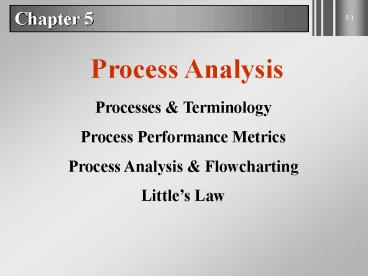Process Analysis - PowerPoint PPT Presentation
1 / 15
Title:
Process Analysis
Description:
Cut WIP to 5000 units, then. TT = TR. WIP. 1000 units/day. 5000 units. 5 day. TT = TR. WIP ... WIP = TR x TT. WIP = Work-in Process Inventory. TR = Thruput Rate ... – PowerPoint PPT presentation
Number of Views:29
Avg rating:3.0/5.0
Title: Process Analysis
1
Chapter 5
Process Analysis
Processes Terminology Process Performance
Metrics Process Analysis Flowcharting Littles
Law
2
Types of Processes
- Make-to-order
- Only activated in response to an actual order
- Both work-in-process and finished goods inventory
kept to a minimum - Make-to-stock
- Process activated to meet expected or forecast
demand - Customer orders are served from target stocking
level - Hybrid
3
Types of Processes
Stage 1
Stage 1
- Single-stage
- Multiple-stage
Buffer
Stage 1
Stage 2
4
Process Terminology
- Blocking
- Occurs when the activities in a stage must stop
because there is no place to deposit the item
just completed - If there is no room for an employee to place a
unit of work down, the employee will hold on to
it not able to continue working on the next unit - Starving
- Occurs when the activities in a stage must stop
because there is no work - If an employee is waiting at a work station and
no work is coming to the employee to process, the
employee will remain idle until the next unit of
work comes
5
More Process Terminology
- Bottleneck
- Occurs when the limited capacity of a process
causes work to pile up or become unevenly
distributed in the flow of a process - If an employee works too slow in a multi-stage
process, work will begin to pile up in front of
that employee. In this is case the employee
represents the limited capacity causing the
bottleneck. - Pacing
- Refers to the fixed timing of the movement of
items through the process
6
Measuring Process Performance
Single-factor Productivity
Output
ProductivityLabor
Labor hours
Total Productivity
Output
- ProductivityTotal
of all inputs
7
Other Process Analysis Metrics
- Utilization Time in Use
- Time Available
- Throughput time Average time for a unit to move
through the system - Operation time Setup time Run time
- Cycle time Average time between completion
of units - Throughput rate 1
- Cycle time
- Efficiency Actual output
- Standard Output
8
Cycle Time Example
- Suppose you had to produce 600 units in 80 hours
to meet the demand requirements of a product. - What is the cycle time to meet this requirement?
- What is the required thruput rate?
Answer The average time between completions is
Cycle time 80 hr./600 units 0.1333
hr./unit or 8 min./unit
Thruput rate 1/(cycle time) 1/(0.1333
hr./unit) 7.5 units per hour or 1/8
units/min.
9
Process Flowcharting
- Process flowcharting is the use of a diagram to
present the major elements of a process
10
Travel authorization process
Secretary types travel authorization (TA)
Traveler informs secretary
To approving manager
Secretary arranges for tickets
To manager
OK?
Wait for Mgr to view
Yes
No
Redo
Manager inspects TA
Travel writes tickets
OK
Wait
Signs
To Travel Disbursing departments
Traveler fetches tickets, check, TA
Secretary gets tickets check
Completes TA
Travels
Wait
Disbursing writes check
11
Simplified process
Disbursing writes check
Traveler types and sends E-mail memo to manager
Wait for manager response
Sent to Traveler
Manager decides
Travels
Yes
No
Travel prints tickets
12
Process Throughput Time Reduction
- Perform activities in parallel
- Change the sequence of activities
- Reduce interruptions
- Cut inventory
13
Littles Law
Inventory and Throughput Time
Suppose TR 1000 units/day WIP 20,000 units
14
Example of Littles Law
Example from Textbook 6 operations, 0.5 min.
each
TT in direct proportion to WIP
15
End of Chapter 5































